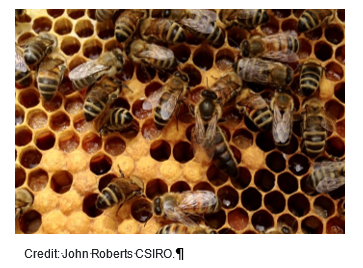Norfolk Island Bee Pest and Disease Survey
12 January 2023By John Roberts Honey bees are an important part of the ecosystem and culture of Norfolk Island. Honey bees support food security through reliable pollination services as well as producing […]

By John Roberts
Honey bees are an important part of the ecosystem and culture of Norfolk Island. Honey bees support food security through reliable pollination services as well as producing honey and hive products. Having access to up-to-date information on bee pests and diseases is critical to maintaining the Island’s bee biosecurity.
In December 2022 and April 2023, Dr John Roberts of the Commonwealth Scientific and Industrial Research Organisation visited Norfolk Island to conduct surveys of the honey bee population. Under the guidance of Norfolk Island’s beekeepers, Dr Roberts collected samples from bees, honey and hives to test for pests and diseases. He sampled 67 bee colonies (approximately 50% of all managed colonies) and inspected and tested for 16 pests and diseases.
The key findings of the survey are:
- Since the last 2012–14 survey, no new honey bee pests or diseases were detected in Norfolk Island honey bees.
- All previously reported pests and diseases were detected, including
- high prevalence and infection levels of the gut parasite, Nosema ceranae
- high prevalence of Lake Sinai virus, a common bee virus group with no known disease
- low detection of the lesser wax moth (Achroia gresella), a minor hive pest.
- The honey bee population on Norfolk Island is unique from a pest and disease perspective. No other honey bee population in the world has fewer pests and pathogens.
The report made three recommendations:
- Permit only commercial importation of certified irradiated honey into Norfolk Island.
- Resource ongoing surveillance in Norfolk Island as part of the National Bee Pest Surveillance Program.
- Registration for all Norfolk Island beekeepers and encouraging beekeepers to perform regular hive inspections in line with Australia’s Honey Bee Industry Biosecurity Code of Practice
The relevant Government agencies are considering these recommendations.
This project was funded by the Department of Infrastructure, Transport, Regional Development, Communications, and the Arts. Support was provided by The Department of Agriculture, Fisheries and Forestry and Plant Health Australia.
